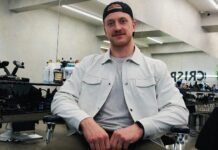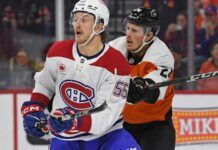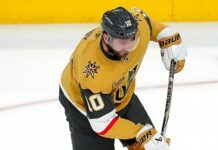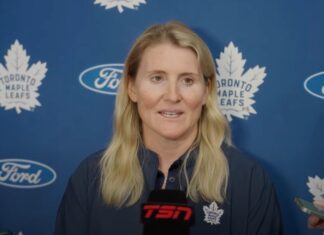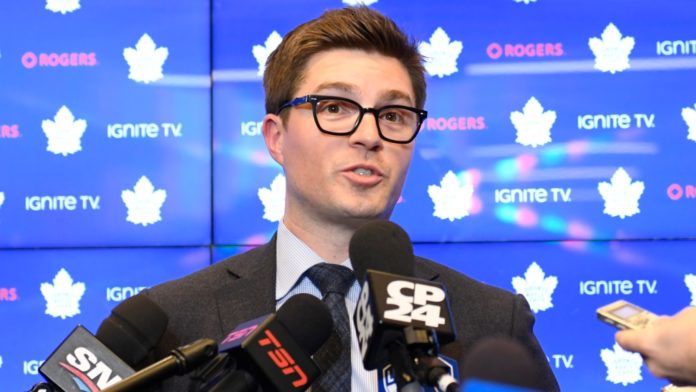
After the conclusion of the 2021 NHL Draft, GM Kyle Dubas discussed the team’s draft selections, the challenge of scouting players during the pandemic, the confirmed loss of Zach Hyman, the team’s lack of involvement in trade activity so far, and the status of contract negotiations with Morgan Rielly.
The drafting of Ty Voit — he hasn’t played a game this season. The challenge for you is to judge him on a 16-year-old year. Can you speak about that process?
Dubas: John and the staff did a great job. John saw him at the showcase in Erie at the showcase the players had organized there. He is a player who had a good underage season with Sarnia, and then you are trying to project what the 17-year-old would have been like.
He is very similar to a lot of players in the OHL. He didn’t play and didn’t go to Europe. You have to use what you know from the 16-year-old season, plus what you know about his character and what you may see anecdotally from scrimmages or insights from strength coaches and people that know the player.
Unfortunately, with the way the season and winter went in Ontario and the restrictions placed on the league, he was in the same boat as a lot of players: not able to play. We will try to help him as much as we can here through the next month and get him set for next season. We are very excited about him.
What did you learn through the challenges of scouting and drafting players in last year’s draft that was helpful for navigating this year’s?
Dubas: The way I look at it is that they are really two separate entities altogether. Last year, because it was March when everything shut down — mid-March — we had a pretty good book on a lot of the players for that draft. What we missed out on that year was really the combine and interview process. I thought John and the staff did a great job last year — along with Will Sibley and Reid Mitchell — in organizing that.
This year, we added Eric Joyce to our staff and he played a key role working to help John as best we could on that interview, getting to know the players as best we could.
This year, we had no personal interaction with any player. That provides a challenge when you are trying to get to know the character of somebody and the type of person coming into the organization. That was the thing that I think we learned from the 2020 draft that we could apply in 2021: how we could improve that process.
As it pertains to the actual draft itself, because of the restrictions on our staff, John and Tim Speltz couldn’t travel. They were able to go to the U18, and that was really the first travel for our scouts for the full year. It was all on video, by and large, for the first-ever time. That presents a real challenge.
We added Ryan Hardy to our staff about a month ago. He had a lot of in-person views from being the GM of the Chicago Steel. He could add some insights that could help John and the staff as best as possible. Otherwise, it was relying on that stretch last year from March to October, and integrating video analysis more deeply into our process, which I found was great.
John and the staff did a great job of that in adapting. It is something, for a scout, is so different than what you are used to. You are used to setting your schedule and traveling on the road to all of the different types of events that are benchmarks throughout the year. This year really had none of those. It will be nice to get back to that next season.
Given the circumstances and given how difficult I made the scouts’ job with only three picks this year, we certainly made the most of it. Now the scouting staff will get to work on the rookie tournament, development camp invites, and get set to go to Traverse City for a great opportunity to see some of the free agents that are going to be left after the seventh round.
Matthew Knies might have fallen to you because of the struggles in the first half of the season. What did you learn about him through the first half of the season that made you not concern about drafting him?
Dubas: It is a better question for John Lilley. The games I had watched happened after our season had ended and they were more late in the season watching the USHL in the playoffs with greater interest. In the games I watched, he played very, very well.
John can probably talk about what he saw early in the year, but for me in this position, it is always great to see someone who struggles, comes through it, emerges, and has that ability to do so. That’s what we saw from Matthew this year.
Obviously, there was a lot of expectation coming in. The first half didn’t go the way that he wanted it to in terms of offense. In the second half, he came out flying and was solid for Tri-City in their playoff series against Fargo.
That is a very strong sign for us in terms of the fact that he is going to go into college next year in a great program in Minnesota. It is not going to be easy. He has now shown he can overcome those challenges and assert himself — and his style of play — even if things don’t go right for him right off of the bat.
Did you find you leaned on Ryan Hardy more than you expected given his experience in the USHL?
Dubas: He would like to think we leaned on him more than ever. In the end, it is trusting John. It is nice to have Ryan interjected at the end. For the Chicago players — they were plentiful in the draft — he obviously has tremendous insights into them but also the other players in that league. He saw them and knows a lot about them. That was a great resource for John, but we don’t want Ryan’s head to get bigger than it is already.
Big picture, could you speak in broad strokes on where you stand in the Atlantic Division? You’re facing the Stanley Cup champion and the runner-up. The Florida Panthers have beefed up. Where do you think you fit in that? What do you have to do in the next week to beef that up?
Dubas: You mentioned some excellent teams, and then there is also the Boston Bruins as well. It is a difficult division. We know what we are up against. We are in the same division as Montreal, who we watched closely. There is Boston and the season they had, and of course, Tampa and Florida. We were kind of all separate last year, but next season is going to be very challenging and very difficult.
We have a big task in front of us in the coming week to put ourselves in a position to contend with those teams and win the division. That will be our goal right from day one. It is not going to be an easy season or an easy road for any of those teams. Everyone will expect to make the playoffs and be in the top three, not in the wildcard race.
We have a lot of work to do. We have to be 100% focused right from day one of training camp to put ourselves in a good position throughout the year.
You mentioned that there were moments where the group got passive in the playoffs. Outside of making additions in free agency and trade, what can you as a management and coaching staff do to advance that and help them get over the hump?
Dubas: I think the answer to that is just to talk openly about it. When you have big moments in your life, regardless of whether you are an athlete, a writer, or whatever you do, you can go in feeling a bit passive, on your heels, and trying to feel things out rather than attacking it. We have been in those moments now the last five seasons and have fallen short in those moments.
What we need to learn is to look to other teams in our league and to other sports as being instructive for us. Other teams have gone through this — maybe not as many times as we have or as early in the playoffs as we have. Get on our toes, be on the attack, believe in what we are capable of when we are at our best — which we have shown a lot over time — and just speak openly about it.
The noise on the outside is going to be accurate. We have lost in the first round of the playoffs five years in a row. We haven’t won a playoff series since 2004. We haven’t won a Stanley Cup since 1967. We can either try to block that out and let the pressure come down, or we can use the pressure to push us forward. I think talking openly about it, getting after it, and attacking that narrative is the best way to go about it as a group.
Earlier today, you mentioned adding forward depth in free agency and looking for a different element. Can you expand on what that might look like for you and what you might be lacking at this point?
Dubas: What I mean by that is just having greater depth and versatility in terms of who can come in and out of the lineup based on the style of the game and the way that they play.
On the backend, looking ahead to Wednesday and the opening of free agency, we added Zach Bogosian last year. That would be the type of player we would be looking at — one or two guys like that again. We have also lost some of our veteran depth from the American League last year on the backend. We will seek to fill those voids just in terms of penalty-killing utility and maybe more of a size-and-strength element on the backend.
Up front, I think it is continuing to find a great identity in the bottom six of our team, working closely with Sheldon and the coaching staff in terms of what they exactly want there, and finding the best players that can be able to go in and execute that. We have come along in that regard, but we are not close to where we want to be. I think there are a lot of teams in our league that provide instructive examples of where we can take that.
We are just trying to find the best players we can to play depth roles. I think it is a great opportunity here for a free agent to come into either the top six playing alongside John and Auston, or alongside Kerf and Ilya on the third line, and then throughout the bottom end of the lineup.
I like our group and what is there. We just need to continue to refine it and find a way to push this group over the top.
Now that Todd Reynolds has made it public that Zach Hyman is moving on, what do you make of that? Do you think you are going to be able to work out anything compensation-wise with Ken Holland before the deadline?
Dubas: I have only heard that Todd made comments. I actually haven’t read the exact comments that were made. If he announced that Zach was moving on, that is about what we expect.
In terms of compensation, I think it is fairly simple. There is a big benefit to me of adding the eighth year on in terms of the cap savings to the team that is going to sign him. We have been on all ends of that. We have been a team that has facilitated retention at the deadline in 2020 between Vegas and Chicago. We have been on the other side of that this year with having to pay to have teams retain and save on the cap. We had the Patrick Marleau situation in 2019 as well.
We know what the value is of that retention, or going to the eighth year with the cap savings. If there is a fair deal to be made to do that, we will do that, but we have been in that situation before at the trade deadline. When you are in that spot, the other GMs aren’t helping you out. They are pulling the pin from the grenade and throwing it to you.
I know there is a narrative that we should just get something, but when you are saving a team significant dollars on the salary cap, that comes with a cost. We are not going to bend on that.
You mentioned you have confidence in the group moving forward earlier this week. Does confidence in the group moving forward take a hit at all with Zach Hyman not being a part of it?
Dubas: The days are kind of all going together here at this point. I believe that was Thursday. At that point, I think it was pretty clear to us, based on the discussions internally and the feeling on it, that he was going to be on the move. We had done what we could to try to make it work. Unfortunately, we couldn’t. Everyone knows how we feel about Zach here. Even though he won’t be here, we are happy for him.
The belief in the group is the same. When I was speaking on that day I was speaking on the group that was going to be moving ahead, not the group that has been here together for a number of years. Nothing, in my mind, changes. It is a loss, but we have to pick up, move on, and do all that we can to put the team in the best position possible for next season.
What are the characteristics you are looking for in a goalie add? Are you looking for someone to mentor Jack? Are you looking for someone to push him?
Dubas: I don’t think Jack needs a true mentor at this point. I think he has been through a lot throughout his career. He has great experience. He has a great disposition. I think Jack is probably more capable of mentoring somebody himself with all of his experiences and the type of year he had last year.
We are really just looking for the best goalie possible to come in, form as good of a tandem as possible, let them get after it, push each other, support each other, and be the best duo that they can to help our team.
You mentioned earlier in the week that lines of communication are open with Frederik Andersen and Alex Galchenyuk. Has there been any communication with Nick Foligno or Zach Bogosian’s representatives? Has there been any preliminary discussion between you and Pat Brisson on an extension for Morgan Rielly?
Dubas: Really, aside from Hyman, the door is open on all of the free agents there. There continues to be dialogue with most of them at this point. The door, I wouldn’t say, is closed to any of those players. There is nothing really new to add on the Galchenyuk or Andersen front. There has been communication with the others you asked about.
With regards to Morgan, there is nothing at this point. Our focus is on the expansion draft, on the draft itself, and then on free agency starting here on Wednesday. Once we see what the market bears as it continues to develop, we will have a better sample size to be able to open discussions with Morgan.
There was a fair bit of player movement and trades the last few days. To what extent were you involved in that kind of stuff? Are you more focused on free agency for improving the team?
Dubas: The types of trades that we saw were a lot of draft-capital trades of which we are not flush. All of them were essentially high-cap-hit-for-high-cap-hit deals or players that were going to be traded and then signed for high cap hits. With our situation here, especially right now, it wasn’t really something that we could be overly active in either because of the lack of picks or because of the fact that we couldn’t trade for the players and then sign them for what they were projected to get.
Our focus has been on free agency. Our way of looking at it is that if we don’t find the players we are looking for in free agency, we will loop back to the trade market. We have our high picks next year, our prospect pool, plus players on our roster teams are always circling around and asking about. We will get to work here on Wednesday — or prior to Wednesday — see what is available, and try to use every avenue we can to improve the team.


